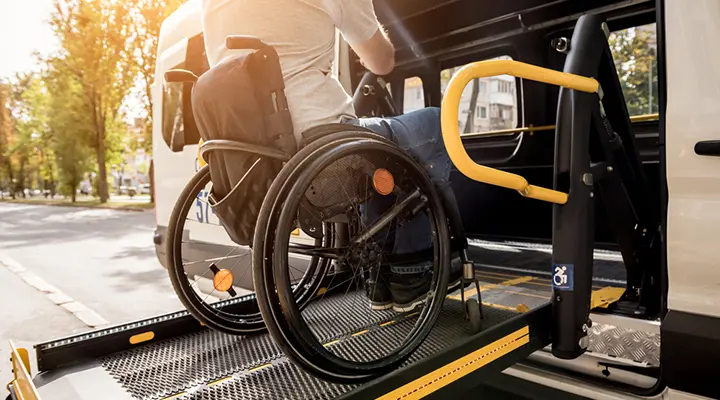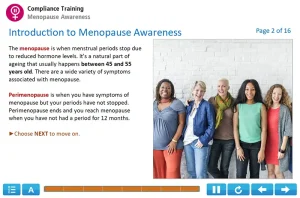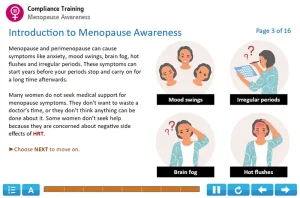Employers cannot afford to ignore menopause issues. About 13 million people in the UK are currently experiencing menopause. About 80% of these people are in work, and many of them find work difficult, or almost impossible, due to menopause symptoms. It is important for employers to help these people in managing the menopause. Women of menopausal age are often highly experienced and at the peak of their careers so they can be vital as role models for other employees.
14 million working days are lost each year for menopause-related reasons.
This article explains some simple facts about the menopause and explores what employers must do, and what they could do, to support menopausal employees.
What is the menopause?
The menopause is when menstrual periods stop and a woman is no longer able to conceive. Perimenopause is the time leading up to menopause when periods are erratic.
Who is affected by menopause?
The menopause is experienced by anyone with a womb. This, of course, includes women. It also includes trans men, some non-binary people and some intersex people. Trans women may experience menopause symptoms due to fluctuating levels of oestrogen. Men do not experience menopause but can be impacted by menopause in partners and other loved ones.
When does the menopause start?
For most women the menopause happens between the ages of 45 and 55. Menopause from 40 to 44 is termed early menopause and before the age of 40 it is termed premature menopause. There are health risks associated with premature and early menopause.
What are the symptoms of menopause?

Some people have no problems during menopause. However, most people experience discomfort and some have a very difficult time. Menopause and perimenopause can cause symptoms like anxiety, mood swings, brain fog, hot flushes and irregular periods. These symptoms can start years before periods stop and carry on for a long time afterwards.
Menopause and the workplace: Legal issues
Under the Equality Act 2010, employers must not operate policies that directly, or indirectly, disadvantage a group of people because of their age or their sex, or because they have a disability.
Since menopause mainly affects women aged 45 to 60, unfair treatment due to menopause could qualify as discrimination due to sex or age.
Menopause qualifies as a disability if the symptoms are long lasting and significantly affect someone’s ability to carry out day-to-day activities. In this case an employer has a duty to make reasonable adjustments for the disability.
Should every organisation have a menopause policy?
There is no legal requirement for an organisation to have a menopause policy. However there are many advantages to such a policy. A menopause policy can raise awareness of menopause issues throughout the company and define the support available to menopausal employees. It can also reduce the number of sick days taken by employees and increase employee retention.
A menopause policy might include:
- Training specifications for managers
- Training specifications for other staff
- A named point of contact for menopause issues
- Information about how to report menopause-related absences
- A description of the support available for menopause problems
- Signposts to external organisations which can provide information and support
- Identification of reasonable adjustments for menopausal employees
What policies and procedures should address menopause issues?
If an organisation has a sickness policy then this should include menopause-related issues. It is good policy to report absences due to menopause symptoms as an ongoing issue, rather than as individual absences.
Risk assessments are a legal requirement and should consider the specific needs of menopausal women. They should ensure that the working environment will not make menopause symptoms worse.
What is a Menopause Champion?

Some companies appoint a Menopause Champion. This person will be well informed about menopause issues including the company’s policies, and provide a safe place for conversations about the menopause. They might arrange workshops, set up support groups and liaise with management on menopuase issues.
What reasonable adjustments will help people with menopause symptoms?
Employers are required to make reasonable adjustments for people who are disabled or have long term health conditions. For menopausal people this might include things like better ventilation, access to water and washing facilities, and flexibility on uniforms.
People may need more or longer comfort breaks during the day.
If an organisation has an occupational health service then menopause problems can be addressed by this team.
What training do managers and other staff need?
Employers should provide menopause awareness training to managers. Training for other staff can be very helpful too.
Training for managers, supervisors and team leaders should cover:
- The law in relation to the menopause
- How to talk to staff and communicate how they are able to raise concerns
- The different stages of menopause and their effects
- How to support and make changes in the workplace to help staff
- How to deal with menopause issues sensitively and fairly
- Gender identity issues and menopause
Our Menopause Awareness training
If you are looking to raise awareness of the menopause within your organisation, then look no further.
Our high-quality online Menopause Awareness training is the perfect cost effective way to train your team. It explains what the menopause is and what the signs and symptoms are. You’ll learn about a range of treatments available and explore how an organisation can support staff who are experiencing menopause.
For questions on discounts or demos, please don’t hesitate to contact our friendly support team support@i2comply.com.





